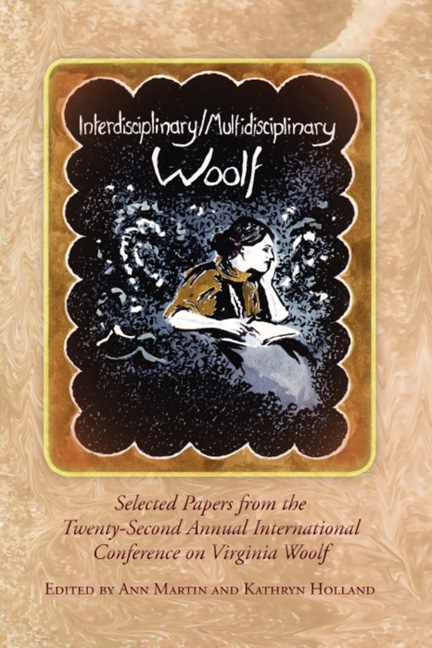Book contents
- Frontmatter
- Contents
- Introduction to Interdisciplinary/Multidisciplinary Woolf
- Acknowledgments
- List of Abbreviations
- History, Materiality, Multiplicity
- Patterns, Practices, Principles
- Art, Influence, Embodiment
- Publishing, Politics, Publics
- “The most unaccountable of machinery”: The Orlando Project produces a textbase of one's own
- The Hotel at the End of the Universe
- Globalization, Inter Connectivity, and Anti-Imperialism: Leonard Woolf, the Hogarth Press, and Kenya
- Chinese Eyes and Muddled Armenians: The Hogarth Press and British Racial Discourse
- “No One Wants Biography”: The Hogarth Press Classifies Orlando
- There Goes the Bride: Virginia Woolf, Julia Strachey, and the Hogarth Press
- Redefining Woolf for the 1990s: Producing and Promoting The “Definitive Collected Edition”
- The Believers: Writers Publishing for Readers, Or Preliminary Musings on The Hogarth Press and McSweeney's
- The Woolfs in Print and Online: A University Press in Transition
- Notes on Contributors
- Conference Program
The Believers: Writers Publishing for Readers, Or Preliminary Musings on The Hogarth Press and McSweeney's
from Publishing, Politics, Publics
- Frontmatter
- Contents
- Introduction to Interdisciplinary/Multidisciplinary Woolf
- Acknowledgments
- List of Abbreviations
- History, Materiality, Multiplicity
- Patterns, Practices, Principles
- Art, Influence, Embodiment
- Publishing, Politics, Publics
- “The most unaccountable of machinery”: The Orlando Project produces a textbase of one's own
- The Hotel at the End of the Universe
- Globalization, Inter Connectivity, and Anti-Imperialism: Leonard Woolf, the Hogarth Press, and Kenya
- Chinese Eyes and Muddled Armenians: The Hogarth Press and British Racial Discourse
- “No One Wants Biography”: The Hogarth Press Classifies Orlando
- There Goes the Bride: Virginia Woolf, Julia Strachey, and the Hogarth Press
- Redefining Woolf for the 1990s: Producing and Promoting The “Definitive Collected Edition”
- The Believers: Writers Publishing for Readers, Or Preliminary Musings on The Hogarth Press and McSweeney's
- The Woolfs in Print and Online: A University Press in Transition
- Notes on Contributors
- Conference Program
Summary
In 1922, the Hogarth Press's fifth anniversary notice described its aims to subscribers as that of “producing works of genuine merit which…could scarcely hope to secure publication through the ordinary channels” (Lee 366). Ninety years later, McSweeney's has described itself as “a literary journal that published only works rejected by other magazines. Th at rule was soon abandoned, [but]…the journal continues to be a major home for new and unpublished writers; we're committed to publishing exciting fiction regardless of pedigree” (“McSweeney's”). With these announcements, the two presses overtly positioned themselves outside of the “ordinary channels” and as explicitly disinterested in prevailing notions of “pedigree.”
Why draw attention to the similarities between two author-run presses operating nearly a century apart? As this paper sets out to suggest, an extended comparative analysis of the Hogarth Press and McSweeney's could afford a number of interesting opportunities, namely: an opportunity to assess the afterlife of historical modernist values as embodied by the strategies that author-publishers have adopted both then and now; an opportunity to examine author-run presses as an expression of the writers’ conceptualization of readers; and an opportunity to explore whether recent work on “reading class” versus “reading culture,” as exemplified by sociologists such as Wendy Griswold, can afford literary critics a supplementary means of understanding the ongoing significance of adopting modernist modes of presenting value and prescribing frameworks of expectations. First, however, a little about how I arrived at this pairing.
In April 2011, Random House announced that they would be reviving the Hogarth imprint in Summer 2012. One year on, the website for this new Random House imprint foregrounds a continued commitment to what is described as the Woolfs’ “determination to publish the newest, most exciting writing” (Hogarth). Upon encountering this attempt by the publishing arm of a multi-national media corporation to leverage the lasting authorial value and the afterlife of historical modernism in order to hail a pre-existing audience—an audience that already has a set of associations with the imprimatur Hogarth—an (initially) unexpected name came to mind: Dave Eggers. Rather quickly a question began to formulate. Is McSweeney's a variation on the original Hogarth Press for a new generation of readers in a new century?
- Type
- Chapter
- Information
- Interdisciplinary/Multidisciplinary Woolf , pp. 262 - 268Publisher: Liverpool University PressPrint publication year: 2013



